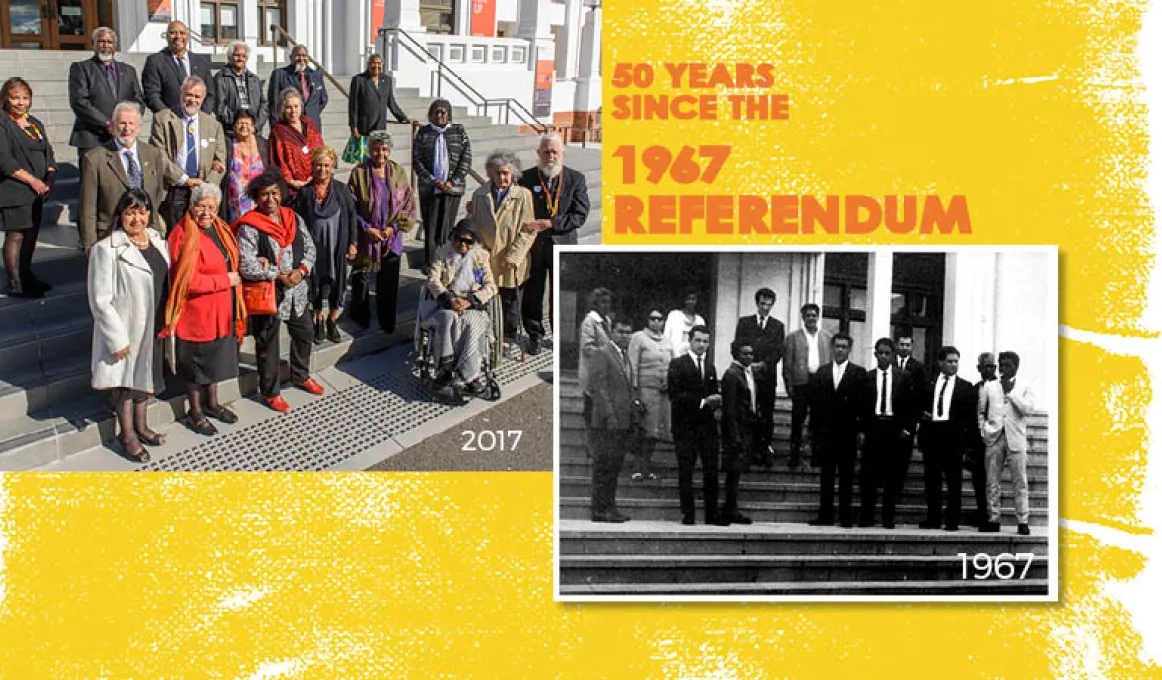1967 Referendum: a profound change for Indigenous peoples

This week Australia celebrates the 50th anniversary of the 1967 Referendum, one of this nation’s greatest and most profound political events.
On 27 May, we celebrate the 50th anniversary of the 1967 Referendum. The result changed how the Australian Constitution referred to Indigenous Australians. It also gave the Commonwealth Government power to make laws for the benefit of Indigenous peoples.
In large part, the resounding ‘Yes’ vote came through the hard work of many Indigenous campaigners.
During the 1950s, Aunty Ruth Wallace Hennings served on the board of the Aboriginal and Torres Strait Islander Advancement League in Cairns, North Queensland. After attending a combined meeting of the League and the Trades and Labour Council, she said she became very interested in what could be achieved for Indigenous people.
“This was the beginning of politics and working in Aboriginal Affairs throughout my entire life and will continue until, justice for all people,” Aunty Ruth said.
In 1967 Dr Gordon Briscoe AO was an Aboriginal member of the Federal Council For The Advancement Of Aborigines And Torres Straight Islanders (FCAATSI). He campaigned in the Bankstown electorate in Sydney doing letter drops and handing out pamphlets titled ‘RIGHT WRONGS WRITE YES FOR ABORIGINES! ON MAY 27’.
“My fondest memories were disposing of the pain of living beyond ‘the Freedom’ of a country my ancestors lived in for forty thousand years and having ‘no rights’ but living under a ‘British-Colonial’ political system that firmly believed that all Aborigines were people ‘beyond Civilisation’,” Dr Briscoe said.
Sandra McGinness remembers the events of 1967 very well. The daughter of Joe McGinness, president of the Federal Council for Aboriginal Advancement and one of the leaders of the ‘Yes’ campaign.
“I would go along with Mum and Dad to meetings and our house in Cairns was like a campaign office. There were always people dropping in to speak to Dad about issues and I would listen in,” Sandra said.
Joe McGinness travelled Australia talking to community groups, unions, churches and anybody who would listen. He met with Prime Minister Sir Robert Menzies and even moved his family from Cairns to Sydney to be closer to other key organisers.
Aunty Ruth worked alongside Joe and other great campaigners.
“My fondest memories were meeting all people from all walks of life and who believed in justice and goodness for all Aboriginal and Torres Strait Islander people. To work alongside men and women from all backgrounds gave me encouragement and confidence to stand up for our rights,” Aunty Ruth said.
There has been debate over the past fifty years about the benefits of the referendum. Sandra said that besides raising awareness of the issues facing Indigenous people, there were several important changes.
“Aboriginal Hostels was also set up, which allowed people to travel for employment, health or education reasons, knowing that there was somewhere they could stay,” Sandra said.
“A lot of young Aboriginal and Torres Strait Islanders aren’t interested in issues like the upcoming referendum, saying ‘I’m not political’. I tell them ‘being born black is political’ so take notice of what’s happening and get involved.”
Aunty Ruth, Dr Briscoe and eight other campaigners met with Prime Minister Malcolm Turnbull in Canberra on Wednesday 24 May to celebrate this historical event.